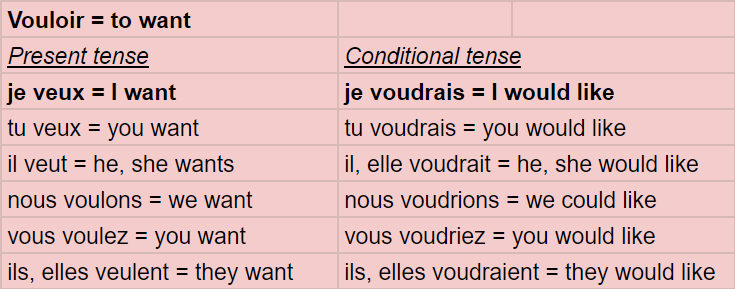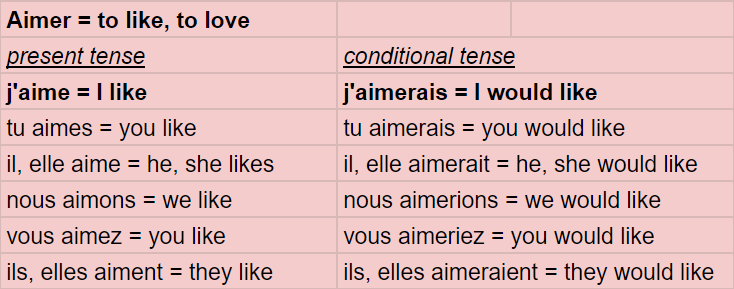Je voudrais un croissant
I’d like a croissant

Je voudrais pronunciation
The pronunciation of “je voudrais” is: Juh voo-dray. The following video demonstrates how to pronounce, “je voudrais”.
How to say “I’d like” in French
The phrase “je voudrais” can be followed by a noun (a thing) or an infinitive (“to” or mother form of the verb).
Je voudrais + noun
When ordering items in restaurants, cafés or bars, use “je voudrais” plus the item that you’d like. The construction is: “Je voudrais + item + s’il vous plaît (please)”. Translations include “I want” or in the more formal sense, “I would like”.
You must place “un, une or des” before the item which you are ordering. These words are called indefinite articles and translate to a, an and some.
Here are some examples of “je voudrais + noun” when ordering meals and drinks.
Je voudrais un café.
I’d like a coffee.
- Je voudrais une bière. I’d like a beer.
- Je voudrais un bon vin rouge. I’d like a nice red wine.
- Je voudrais un Coca. I’d like a Coke.
- Je voudrais du poulet. I’d like some chicken.
- Je voudrais du fromage. I’d like some cheese.
Je voudrais + infinitive
When preceding an infinitive, “Je voudrais” means “I would like to”, as in “I would like to eat“. Here are some examples of je voudrais + infinitive.
Je voudrais acheter une voiture.
I’d like to buy a car.
- Je voudrais acheter I’d like to buy
- Je voudrais être I’d like to be
- Je vourdais avoir I’d like to have
- Je voudrais aller I’d like to go
- Je voudrais faire I’d like to make/do
- Je voudrais parler I’d like to speak
- Je voudrais manger I’d like to eat
Je voudrais vs. je veux
In French, it is important to distinguish between “Je voudrais” (I’d like) and “Je veux” (I want).

What exactly is voudrais?
Je voudrais is the conditional (would tense) of the verb “vouloir”, which means to want. Hence, while “Je voudrais” means “I’d like”, the literal translation is “I would want”.
When to use “je veux”
When speaking to friends and close associates, it is okay to use “veux”. For example you may ask a friend, “Qu’est-ce que tu veux?” (What do you want?).
When answering this question to a friend, you may reply:
Je veux un café.
I want a coffee.
When to use “je voudrais”
However, when speaking to strangers or in more formal situations, it would be considered impolite to say “je veux”. In these situations it is of utmost importance to use the polite form, “je voudrais”.
To ask what somebody wants, ask: “Qu’est-ce que vous voudriez?” or “Que voudriez-vous” (What would you like?).
Examples of polite answers include:
Je voudrais du vin blanc, s’il vous plaît.
I’d like some white wine, please.
J’aimerais also means “I would like”
Another common way to say, “I would like” is “j’aimerais”. This is the conditional form of the verb aimer (to like, to love).

In the context of expressing what you’d like to do, “j’aimerais” and “je voudrais” are considered synonyms. You may use them interchangeably.
- Je voudrais partir demain. I’d like to leave tomorrow.
- J’aimerais partir demain. I’d like to leave tomorrow.
However, in the context of requesting things (such as ordering meals), it’s best to use “je voudrais”. For example:
Je voudrais la salade niçoise.
I’d like the Niçoise salade.
Je voudrais bien and j’aimerais bien
To commonly used expressions include “Je voudrais bien” and “J’aimerais bien”. Both expressions translate to “gladly” and “really like to”. They are synonymous and maybe used interchangeably.
For example, when asked, “Voudriez-vous dîner au restaurant français?” (Would you like to dine in a French restaurant?”, you may reply:
Oui, je voudrais bien.
Yes, glady.
Oui, j’aimerais bien.
Yes, gladly.
When preceding an infinitive, these expressions translate to “I’d really like to”. For example:
- Je voudrais bien aller au cinéma. I’d really like to go to the movies.
- J’aimerais bien aller au cinéma. I’d really like to go to the movies.
Other ways of saying I’d like in French
In addition to “je voudrais” there are some other ways to express, “I’d like” in French.
Donnez-moi and donne-moi
Donnez-moi and donne-moi both translate to “give me”. These are the formal and informal forms of the verb donner (to give) in the imperative (commanding tense).
Using “donnez-moi” is a much more direct way of saying, “I’d like”. For example, in the market you may say:
Donnez-moi deux kilos de tomates.
Give me two kilos of tomatoes.
All French Word of the Day Lessons

All French lessons by David Issokson

